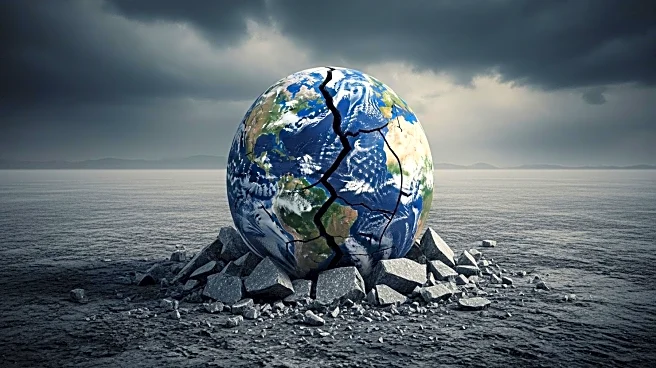What's Happening?
A powerful earthquake with a magnitude of 6.0 struck eastern Afghanistan near the Pakistan border late Sunday, causing significant destruction and loss of life. The epicenter was located 17 miles east-northeast of Jalalabad in Nangarhar province, with a depth of 5 miles, according to the U.S. Geological Survey. The quake resulted in the destruction of numerous villages, killing at least 250 people and injuring 500 others. The Kunar Disaster Management Authority reported that the districts of Nur Gul, Soki, Watpur, Manogi, and Chapadare were severely affected. Rescue operations are ongoing, with medical teams from Kunar, Nangarhar, and Kabul arriving to assist. The earthquake was followed by several aftershocks, including a 5.2-magnitude tremor.
Why It's Important?
The earthquake highlights the vulnerability of Afghanistan to natural disasters, particularly due to its location near the junction of the Eurasian and Indian tectonic plates. The impact on the affected regions is severe, with many villages completely destroyed and a significant number of casualties. The disaster poses challenges for the Taliban-led government in terms of emergency response and resource allocation. The international community may need to provide humanitarian aid to support recovery efforts. The event underscores the need for improved infrastructure and disaster preparedness in Afghanistan.
What's Next?
Rescue operations are expected to continue as authorities work to reach remote areas and assess the full extent of the damage. The death toll and number of injuries are likely to rise as more information becomes available. The Afghan government may seek international assistance to aid in recovery efforts. Long-term rebuilding and support for affected communities will be necessary to restore normalcy. The disaster may prompt discussions on enhancing earthquake preparedness and infrastructure resilience in the region.
Beyond the Headlines
The earthquake's impact on Jalalabad, a key trade city, could disrupt economic activities and cross-border trade with Pakistan. The destruction of agricultural areas may affect food supply and local economies. The event may also influence regional geopolitical dynamics, as Afghanistan seeks support from neighboring countries and international organizations. The disaster raises ethical considerations regarding the protection of vulnerable populations and the allocation of resources for disaster relief.









